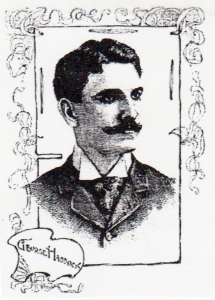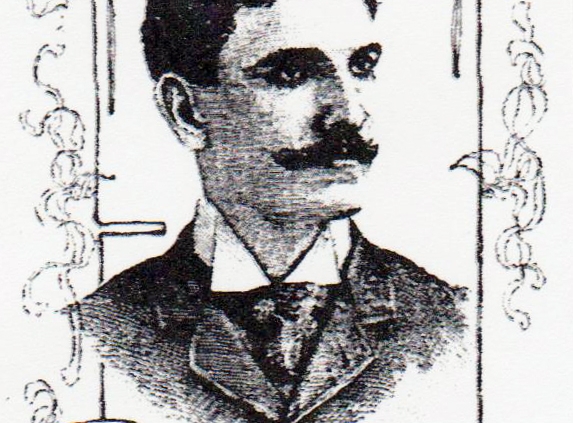August 5, 1892: Triple play helps preserve a Beaneaters shutout

When the 1892 season ended, the Boston Beaneaters had prevailed again and taken the pennant. The Brooklyn Bridegrooms – sixth-place finishers in 1891 – gave them a battle for the flag in 1892, finishing just 2½ games behind Boston for the first half of the season.
At the close of play on August 4, however, the Cleveland Spiders were in first place in the second-half standings by one game over Brooklyn, and Brooklyn held a half-game lead over Boston. For the year as a whole, Boston was up two over Brooklyn. The two teams had battled, but the Beaneaters had been tenacious and had dropped as low as second place on only four days during the season. Boston had just finished an 18-game homestand, playing Brooklyn on August 5 in the first game of a 25-game road trip.
Brooklyn manager Monte Ward asked right-hander George Haddock to pitch. Haddock had overcome a disastrous 9-26 season for Buffalo in 1890, pitching for Arthur Irwin’s Boston Reds (American Association) in 1891 and posting a record of 34-11 with a 2.49 ERA that was less than half of his 1890 mark. When the Reds folded, he was secured by Brooklyn. He was 29-13 (3.14) for Brooklyn in 1892, winning the most games on the staff. And he pitched a whale of a game on August 5, going the distance through 12.
Boston’s Frank Selee entrusted the game to Kid Nichols. This was Nichols’ third season in the majors; he never won fewer than 20 games in his first nine seasons. He was coming off a 30-17 season, and wound up 1892 topping that, 35-16 (2.84 ERA). Nichols held the edge over Haddock on August 5, but it was a scoreless battle through 11 innings.
The New York Herald allowed as how Brooklyn should have won the game, 1-0, after the regulation nine but that “an unfortunate decision at the plate in the fourth inning deprived [left fielder Darby] O’Brien of a run and allowed [King] Kelly’s men to complete a triple play.”1
Haddock held Boston to only three hits all game long. Brooklyn had seven hits (or six, or eight – accounts differ.) Brooklyn had “outbatted and outfielded their bean eating rivals but luck was all the other way.”2 The Herald was critical of umpire Tom Lynch who, the newspaper claimed, “marred his usually good work by allowing the Boston players to indulge in tactics that were very close to rowdyism.”3
The game was won in the top of the 12th when Haddock hit Boston first baseman Tommy Tucker for the second time in the game, and left fielder Jack Stivetts followed with a home run. Stivetts, normally a pitcher, played outfield in 18 games during 1892. Bobby Lowe had suffered a fractured arm and Stivetts filled in for him in left.
Threatening weather had kept the Eastern Park crowd down to a reported 2,287. Because the game was so close, the spectators were “kept at the highest pitch of excitement” throughout the 2-hour, 125-minute game.4 The triple play in the fourth followed a walk to Tom Daly and a single by O’Brien. Catcher Con Daily bunted and reached on an error by his Boston counterpart, catcher King Kelly. That loaded the bases. Haddock came to the plate. He hit a “short bounder” to Boston third baseman Billy Nash, who fielded the ball and threw to Kelly to force Daly at home plate. Kelly threw to first baseman Tucker, retiring him. O’Brien kept running around third, so Tucker fired the ball home and the umpire called him out at the plate “amid a storm of hisses.”5
Stivetts’s home run was hit in the gap between right field and center. Shortstop Long and pitcher Nichols had the other two hits for the Bostons.
The Bostons tried to take advantage of Tom Daly playing third base instead of the usual Bill Joyce, and three times in the first inning hit the ball to Daly, who handled each ball well.
The Brooklyn Eagle came down hard on Lynch, titling its game account, “Umpire Lynch Did It.”6 The paper allowed that those present “witnessed one of the finest exhibitions of ball playing this year … a first class treat.” It noted that catcher King Kelly was battered about by balls striking him on the hand, the arm, and both legs, but he played with pluck and even, bantering with the crowd, predicted the triple play: “Just you hold your horses, now,” he declaimed, “here’s where we cut ’em off with a triple play.”7
Kelly, the Eagle reported, “kept his tongue wagging all through the game.” The paper’s correspondent detailed the injuries he suffered and reported extensively on the banter by various players throughout the game. The game account arguably presents a colorful picture of what baseball of the day was like. Kelly was repeatedly referred to as “the king.”
As to the fourth-inning triple play, the Eagle called it “phenomenal” and “the finest ever seen at Brooklyn,” also noting that Brooklyn manager Ward “kicked at the decision which made O’Brien out, though he was not in position to see the play.” It did, however, report that Boston manager Selee, Stivetts, and left fielder Lowe (present, despite his arm injury) “all … were certain that Darby [O’Brien] was safe and expressed their opinions accordingly.”8
The New York Times wrote, without any rancor, that “every person on the ground” thought Kelly had failed to tag O’Brien at the plate, observing dispassionately, “If the decision was incorrect and the Bostons failed to make the triple play, then Umpire Lynch was responsible for the loss of the game.”9
From the sixth to the 12th inning, neither team made a base hit except for a 10th-inning single by a Brooklyn batter. As the 12th inning began, it was starting to get a little dark and Kelly called out, “Come, boys, let’s finish this up. I want my supper awful bad and I’m tired of this.” After Tucker was hit by the ball, Kelly shouted out, “Now, Tucker, old boy, look sharp, and we’ll win the game right here.” Then, as Stivetts stepped in, he yelled, “Here’s our heavy weight pitcher, and he’s just the man to do the job!”10
The Boston Globe led its account saying, “Jack Stivetts covered himself with glory at Eastern Park, Brooklyn, this afternoon.”11 With Tucker on first base in the 12th, “the sturdy pitcher … picked up a flat bat, but after knocking a couple of foul balls concluded to change to his old reliable wagon tongue.”12 He struck the next pitch: “it flew on a line between [center fielder Mike] Griffin and [right fielder Oyster] Burns and before either of these speedy men could get the ball and return it to the pate, Jack had crossed the rubber.”13
The Globe’s account singled out both third basemen for exceptional fielding, and noted that the pitchers’ duel was so well appreciated by the small crowd that “the spectators gave each of the twirlers a round of applause after every inning.”14There was considerable detail reported, but no mention of Lynch or question raised about his call in the fourth inning. The Globe wrote that the play was “loudly applauded.”
Attending the game from Boston was irrepressible fan Arthur “Hi Hi” Dixwell, whose cries of “Hi! Hi!” punctuated each Boston play. He passed out a box of Reina cigars after the victory.
The Brooklyn loss dropped the Bridegrooms to third place in the second-half standings, a half-game behind Boston rather than a half-game ahead.
For Stivetts, the home run was one of three he hit in 1892. He was a good-hitting player with a career .302 batting average in National League play.
Notes
1 “A Hard Game to Lose,” New York Herald, August 6, 1892: 8.
2 Ibid.
3 Ibid. There was no reference to anything akin to rowdyism in the other newspaper accounts, though the next day one newspaper expressed the thought that Kelly’s banter with the fans could be deemed rowdy.
4 “The Home Teams Defeated,” New York Tribune, August 6, 1892: 10.
5 Ibid. The characterization “short bounder” comes from the Brooklyn Eagle account. The Times called it a “sharp grounder.”
6 “Umpire Lynch Did It,” Brooklyn Eagle, August 6, 1982: 3.
7 Ibid.
8 Ibid.
9 “Twelve Innings Played,” New York Times, August 6, 1892: 3.
10 “Umpire Lynch Did It.”
11 “Saved the Day,” Boston Globe, August 6, 1892: 5.
12 Ibid.
13 Ibid.
14 Ibid.
Additional Stats
Boston Beaneaters 2
Brooklyn Bridegrooms 0
12 innings
Eastern Park
Brooklyn, NY
Corrections? Additions?
If you can help us improve this game story, contact us.


